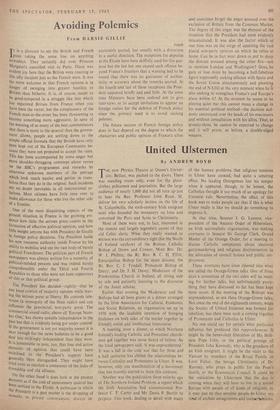Avoiding Polemics
From DARSIE GILLIE
PARIS
IT is a pleasure to see the British and French press taking the same line on anything nowadays. They certainly did over Princess Margaret's cancelled visit to Paris, There was evident joy here that the British were reacting to this silly incident just as the French were. It, was the more welcome in that French opinion is in danger of swinging into greater hostility to Britain than hitherto. It is, of course, easier to be good-tempered in a struggle like that which has separated Britain from France when you have been the victor, but the complacency of the French man-in-the-street has been threatening to become something more aggressive. In spite of the warning of so many of the best commentators that there is more to the quarrel than the govern- ment allows, people are settling down to the simple official formula that the British have only been kept out of the European Community be- cause they were not prepared to accept the rules. This has been accompanied by some anger but more shoulder-shrugging contempt about verses on the BBC's programmes and remarks by otherwise unknown members of the peerage which look much nastier and pettier in trans- lation than they do in the original. Such incidents are no doubt inevitable in all international re- lations. Most citizens have little time over to make allowance for those who live the other side of a frontier.
One of the most disquieting aspects of the present situation in France is the growing evi- dence how little the serious press counts in the formation of effective political opinion, and how little weight anyone has with President de Gaulle in foreign policy decisions. The President holds his now immense authority inside France by his ability to mobilise and use the vast body of barely political Frenchmen. The political part of French newspapers was always written for a minority of Political-minded persons and was indeed barely comprehensible under the Third and Fourth Republics to those who were not keen supporters of this or that political group.
The President has decided—rightly—that he can keep control of majority opinion while leav- ing the serious press at liberty. He controls tele- vision (a monopoly of the State radio) and can influence the provincial, non-party press. The commercial sound radio, above all 'Europe Num- ber One,' has shown notable independence in the Past but that is evidently being got under control. If the government is not yet majority owner it is near enough for the news bulletins to be a good deal less strikingly independent than they were. It is lamentable to note, too, that free and active elements of opinion that could have been mobilised to the President's support have generally Teen disregarded. They might have tried even so resolute a contemner of the links of friendship and old alliance.
On the other hand it does look at the present moment as if the cost of unnecessary quarrel has been noticed in the Elys6e. A technique in which the President is a past master is the dropping of remarks in private conversation, always in-
accurately quoted, but usually with a distortion in a useful direction. The receptions for deputies at the Elysee have been skilfully used for this pur- pose but the last but one caused such offence be- yond France's frontiers that a warning had to be issued that there was no guarantee of authen- ticity or accuracy about the remarks quoted. At the fourth and last of these receptions the Presi- dent appeared briefly and said little. At the same time Ministers have been ordered not to give interviews or to accept invitations to appear on foreign radios for the defence of French policy since the primary need is to avoid inciting polemic.
The future success of French foreign policy does in fact depend on the degree to which the chanceries and public opinion of France's allies
and associates forget the anger aroused over the exclusion of Britain from the Common Market. The degree of this anger was the element of the situation that the President had most evidently miscalculated. It was also the factor which at one time was on the verge of upsetting the vast placid non-party opinion on which he relies at home. Can he in fact wear down or, put to sleep the distrust aroused among the other five—not to mention London and Washington? Does_ he gain or lose more by becoming a half-fabulous figure supposedly seeking alliance with Spain and the Soviet Union simultaneously and planning the end of NATO at the very moment when he is also seeking to strengthen France's and Europe's place within it? At the moment he seems to be playing quiet but this cannot mean a change in his essential political method—the decision sud- denly announced over the heads of his executants and without consultation with his allies. That, at seventy-three, he cannot be expected to change and it will prove, as before, a double-edged weapon.


































 Previous page
Previous page